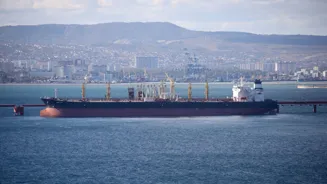According to a Times of India report, citing CREA, European Union countries have accounted for 23% of Russia’s fossil fuel export revenues since the onset of the Ukraine conflict, nearly double India’s share of 13%.
Additionally, tankers owned or insured by G7+ countries are transporting over half of all Russian oil exports, underlining the continued role of Western economies in sustaining Russia's energy revenues, added the report.
Reacting to the data, Indian government sources pointed to what they called "Western hypocrisy" in targeting India for safeguarding its energy security, while largely overlooking similar actions by European nations and their allies.
The EU, the sources said, has not only continued importing Russian energy but also maintained trade in other sectors, including fertilizers, chemicals, iron, steel, and transport equipment — despite publicly backing sanctions against Moscow.
"These figures only vindicate India's emphasis on ensuring for its citizens regular and affordable energy supplies,"
As the US doubled tariffs on Indian goods to 50% on Wednesday for allegedly “fuelling the Russian war machine,” and the EU last month sanctioned Indian refiner Nayara Energy, a new report by CREA has reignited the debate over Western double standards.
Russia has earned €923 billion from fossil fuel exports since the Ukraine war began. Of this, €212 billion came from EU nations, nearly double India’s €121 billion contribution. China topped the list with over €200 billion in purchases, according to CERA.
Significantly, CERA noted that G7-owned tankers are increasingly transporting Russian oil, especially after the EU’s latest sanctions in June, highlighting what Indian officials call a clear gap between Western rhetoric and action.
"Since Jan, the G7+ share in Russian oil transport has increased from 36% to 56%," it says.
More than half of Russian seaborne oil exports were transported in G7+ tankers in June, reflecting a six percentage point increase over May.
The use of Western tanker fleets indicates that these shipments adhered to the price cap and other sanction terms.
India maintains that its imports of Russian oil, around 9% of global daily supply, have helped stabilise prices and prevent market shocks. This aligns with the rationale behind the US and EU’s price cap strategy, which aimed to limit Moscow’s revenue without disrupting global oil flows.
Despite an 8% rise in export volumes in Q2 2025 compared to the previous quarter, the CERA notes that “Russian fossil fuel revenues in second quarter of 2025 dropped by 18% year-on-year — lowest in a quarter since the invasion of Ukraine.”
Trump slaps 50% tariff, sparks trade tensions
On Wednesday, President Trump issued an executive order imposing an additional 25% tariff on goods from India, as penalty for importing Russian oil.
Wednesday’s hike comes in addition to the 25 percent tariff India already faces, making it subject to one of the US’s highest import tax brackets under Trump, at a total of 50%.
Trump’s order stated that “the actions and policies of the Government of the Russian Federation continue to pose an unusual and extraordinary threat to the national security and foreign policy of the United States.”
India’s Ministry of External Affairs responded sharply, calling the decision “unfair, unjustified and unreasonable.”
The government questioned why India was being penalised while other major importers of Russian oil were spared.
“We have already made clear our position on these issues, including the fact that our imports are based on market factors and done with the overall objective of ensuring the energy security of 1.4 billion people of India,” the statement said.
“It is therefore extremely unfortunate that the US should choose to impose additional tariffs on India for actions that several other countries are also taking in their own national interest,” it added.
The move comes despite five rounds of bilateral trade talks and a high-level visit by US Vice President JD Vance in April.
With no trade deal reached, experts say US-India ties are now under the greatest strain in years. Brazil remains the only other country facing a 50% tariff under the same order.
With inputs from agencies
















